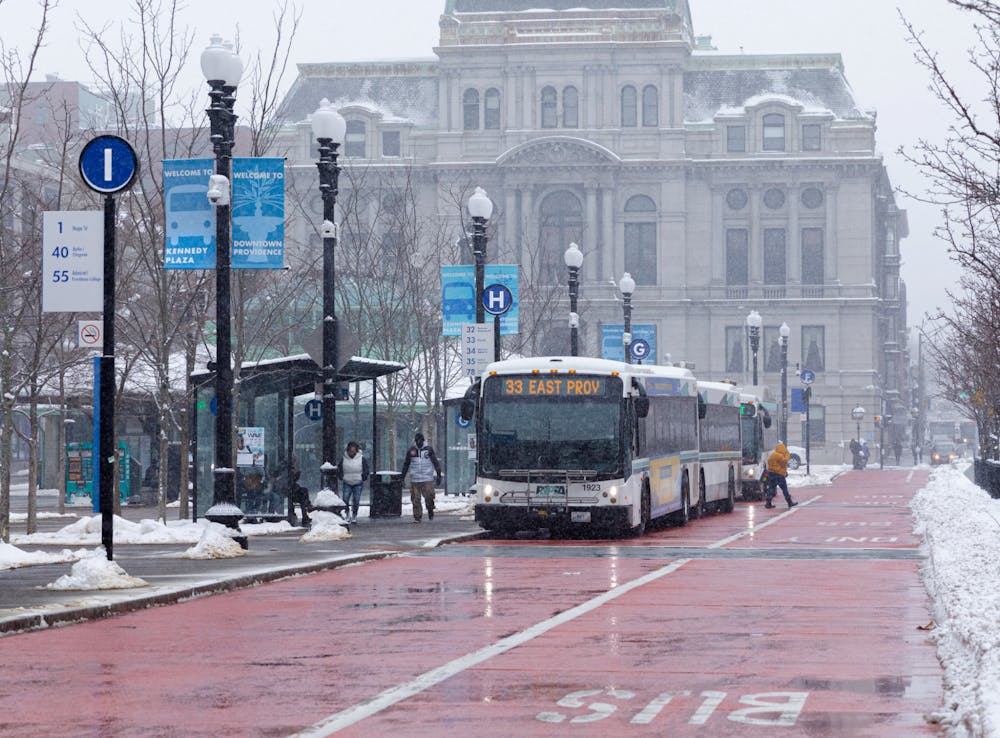Few locations in Providence — if any — see more opioid overdoses than Kennedy Plaza.
Heat maps show that the Rhode Island Public Transit Authority bus terminal has among the highest rates of overdoses in Providence.
“It is the epicenter for overdose(s) in the state of Rhode Island,” said Haley McKee, an overdose survivor and public health advocate who was present at Kennedy Plaza during a reported December overdose.
Opioid overdoses are the leading cause of accidental death in Rhode Island, with 435 people dying of overdoses in 2021. And while naloxone, popularly referred to as Narcan, works to reverse the effects of an overdose, McKee has explained that the life-saving drug is hard to come by in Kennedy Plaza, the Providence Journal previously reported.
Which is why advocates like McKee have pushed RIPTA to implement resources and harm reduction strategies to counter overdoses for years.
Kennedy Plaza is a focal point for addressing the harm caused by opioid use and overdoses, said Dennis Bailer, overdose prevention program director at Project Weber/RENEW, an organization focused on peer-led harm reduction in the Ocean State.
“A lot of the people that we work with who may have substance abuse disorder(s) tend to gather down (in Kennedy Plaza),” Bailer said.
Due to the concentration of overdoses and opioid use in Kennedy Plaza, activists like Bailer and Alexandrea Gonzalez, founder and executive director of the nonprofit Gather Together United as 1, said they have attempted to work with RIPTA. Both separately reported little response from the transit authority. GTUA1 focuses on “supporting at-risk and unsheltered people in Providence,” according to the group’s website.
“We tried for many years to engage directly with RIPTA as an organization to do Narcan training (and) supplying Narcan,” said Bailer, noting that the group has not succeeded in engaging with RIPTA.
According to Gonzalez, when she and colleagues distributed Narcan in the plaza on International Overdose Awareness Day in August 2022, RIPTA supervisors intervened and forced the advocates to leave the plaza.
But RIPTA may be on the verge of implementing new harm reduction measures, wrote Director of Public Affairs Barbara Polichetti in an email to The Herald.
“RIPTA is in ongoing discussions specifically on harm reduction with Mayor (Brett) Smiley, the Downtown Improvement District and the Department (of) Health,” Polichetti wrote when asked about the transit authority’s reported unwillingness to engage with advocacy groups and the reported shutdown of the Narcan distribution.
“An update will be provided when those decisions conclude,” she wrote.
She added that the transit authority has met with the Rhode Island Department of Health and Office of Health and Human Services to discuss “the possibility of offering voluntary training to RIPTA staff to administer Narcan.” RIPTA will additionally look for “potential places where Narcan could be housed/placed around the Kennedy Plaza area,” she wrote.
Before those trainings, RIPTA will look to identify locations to place sharp disposal containers and Narcan, in addition to creating a “regular cleaning schedule of needles … in Kennedy Plaza,” Polichetti wrote. “There will be more meetings to discuss specifics and details over the coming weeks.”
Alex Macmadu ’14 MA’15 PhD’22, postdoctoral research associate in the University’s department of epidemiology, likened naloxone to automated external defibrillators, which deliver an often lifesaving electric shock to those experiencing sudden cardiac arrest.
“The difference between a non-fatal overdose and a fatal one is naloxone,” she said. “At the Kennedy Plaza bus station, Naloxboxes should be placed in all the restrooms and regularly serviced to keep naloxone readily in reach.”
Advocates have also pushed for solutions beyond needle disposal kits: McKee and Macmadu called for Narcan-depositing vending machines, while Bailer noted the positive impact freely available first aid supplies would have in Kennedy Plaza.
Gonzalez also emphasized that any new harm reduction strategies should be included at the planned Dorrance Street Transit Center.
“It doesn’t matter if we go to Dorrance or go to Kennedy Plaza,” she said, noting that issues related to substance abuse and a need for transportation will exist regardless of location.
Samantha was a University News editor overseeing the affinity and activism beat.





